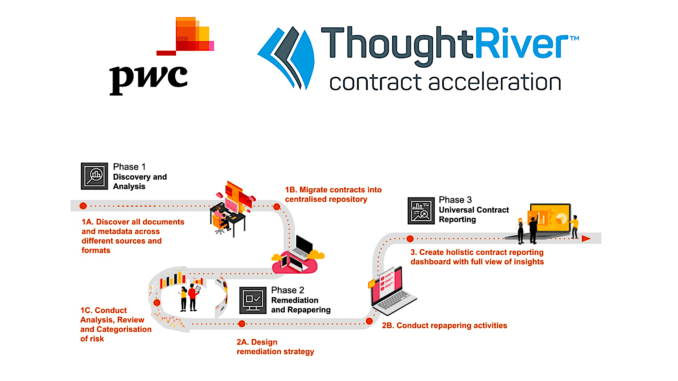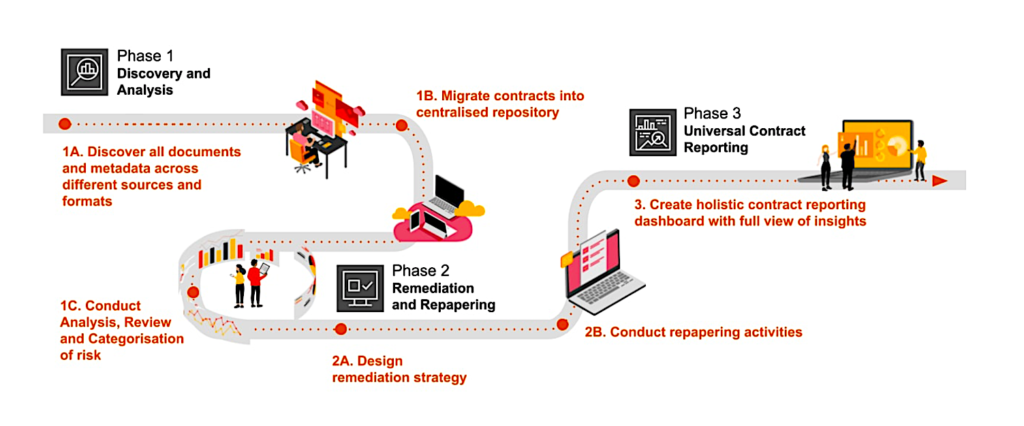
The NewLaw arm of Big Four firm, PwC, and NLP-driven contract analysis pioneer, ThoughtRiver, have created a solution to solve the Schrems II repapering challenge.
The two organisations have been working together on contract review needs for the last couple of years and have now built an all-in-one solution for handling the review and repapering of potentially many thousands of contracts that contain out of date references to how data transfers are handled.
Why does this matter? Basically because Schrems II is a 2020 European court judgement that ‘fundamentally impacts the way in which companies transfer personal data across borders’ explained Graham Edwards, Senior Transformation Lead, PwC NewLaw.
And more specifically: ‘The decision means that businesses are now required to undertake Transfer Risk Assessments, including specific Country Assessments, before transferring data from the EU and UK to countries which are not deemed ‘Adequate’.’ Moreover organisations have until December 27, 2022 to make sure they have ‘remediated all existing contracts which contain the old Standard Contract Clauses (SCCs)’, he added.
OK, makes sense. But what is ThoughtRiver doing as part of this? This is how they explain things:
- ‘ThoughtRiver can be used to help automate the remediation process at a contract and clause level and ensure ongoing compliance in all future contracts. To do this a playbook must be defined with fallback positions and escalation routes. PwC can work with you to create this playbook and then train the ThoughtRiver algorithm.
- Every contract uploaded into ThoughtRiver’s platform will be reviewed for SCC compliance. Where required you are provided with advice notes and a suggested replacement clause from the PwC data privacy team.
- [In turn], the Schrems II report inside the ThoughtRiver platform [shows] how many contracts have clauses that need remediating.
And, naturally PwC will help companies with this process, and with the triaging and planning stages of getting all their contracts into compliance before the deadline. Or, in short this is the tech, the legal expertise, and the consultative project management capability, all linked together in one offering.
As Edwards explained: ‘Looking for a needle in a haystack has nothing on looking for old SCCs in a digital pile of contracts. For already-stretched teams, it can seem like an impossible task. That’s why PwC are working with ThoughtRiver to provide solutions that make the identification of affected contracts and the subsequent remediation process easier.’
He added that this approach provided ‘efficiencies, cost savings, and process improvements’.

Is this a big deal? How much of a money-spinner this turns out to be remains to be seen, but it’s a classic example of combining:
- Legal expertise so customers are sure they are getting the right inputs from bona fide lawyers, (and it’s worth noting that PwC has its own lawyers in the UK),
- Process experts and project managers to design a logical and efficient workflow for solving the problem,
- And, technology provision – often with an NLP core – for the analysis and surfacing of key language in documents.
The end result is a faster and more consistent outcome for the clients. Naturally, this doesn’t have to be provided just by Big Four firms, any business that can bring together these three areas can do this – and a growing number of law firms, as well as other ALSPs, are certainly able to apply this approach to high volume contract needs.
It also sums up the way the market is increasingly moving and underlines the interlinked nature of solving legal challenges today, at least where we have either volume or a high frequency of related material, i.e. legal knowhow + process and project design + tech = a productised approach to solving a recurring legal problem.